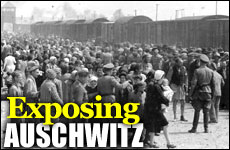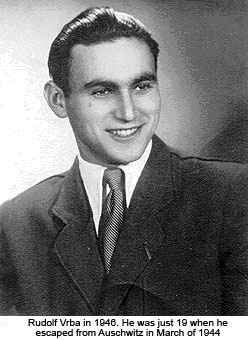 Identifying as a Jew
Identifying as a Jew


5 min read
Rudolf Vrba's report saved 200,000 Hungarian Jews. It could have saved three times that number.
This month marks the 65th anniversary of a daring escape from Auschwitz, by a teenager who then revealed the truth about the death camp - only to be ignored by the Allied leadership.
In March 1944, the Germans occupied Hungary and began preparing to deport that country's Jews -- numbering approximately 750,0000 -- to Auschwitz. A 19-year-old prisoner named Rudolf Vrba, together with fellow-inmate Alfred Wetzler, decided to do something that almost nobody had ever done before: escape from Auschwitz. They were determined to alert the world about the doom that Hungarian Jews would soon face.
On April 7, Vrba and Wetzler slipped away from their slave labor battalion and hid in a hollowed-out woodpile near the edge of the camp. On the advice of Soviet prisoners of war, the fugitives sprinkled the area with tobacco and gasoline, which confused the German dogs that were used to search for them.
"Were they going to bomb the camp? Was this the end of Auschwitz?"
On their second day in the woodpile, Vrba and Wetzler heard Allied warplanes overhead. "They came closer and closer -- then bombs began to crunch not far away," Vrba later recalled in his searing memoir I Cannot Forgive. "Our pulses quickened. Were they going to bomb the camp? Was the secret out?... Was this the end of Auschwitz?"
The Allied planes were actually bombing German oil factories in and around the Auschwitz complex. The idea of bombing the death camp had not yet been proposed to the Allied leadership, and details such as the location of the gas chambers and crematoria were not yet known to the Allied war command. But that was about to change.
 On April 10, in the dead of night, Vrba and Wetzler emerged from the woodpile and began an 11-day, 80-mile trek to Slovakia. There they met with Jewish leaders and dictated a 30-page report that came to be known as the "Auschwitz Protocols." It included details of the mass-murder process, maps pinpointing the gas chambers and crematoria and warnings of the impending slaughter of Hungary's Jews.
On April 10, in the dead of night, Vrba and Wetzler emerged from the woodpile and began an 11-day, 80-mile trek to Slovakia. There they met with Jewish leaders and dictated a 30-page report that came to be known as the "Auschwitz Protocols." It included details of the mass-murder process, maps pinpointing the gas chambers and crematoria and warnings of the impending slaughter of Hungary's Jews.
"One million Hungarian [Jews] are going to die," Vrba told them. "Auschwitz is ready for them. But if you tell them now, they will rebel. They will never go to the ovens."
A copy of the report was given to Rudolf Kastner, a Budapest Jewish leader. Instead of publicizing the information, Kastner negotiated a deal that involved bribing the Germans to permit a train with 1,684 of his relatives, friends and Hungarian Jewish leaders to leave the country. Kastner's action became the centerpiece of a controversial trial in Israel after the war.
Another copy of Vrba's Auschwitz Protocols was given to Rabbi Michoel Dov Weissmandl, a rescue activist in Bratislava, who then wrote the first known appeal for the use of Allied air power to disrupt the mass murder. Weissmandl's plea to the Allies to bomb the railroad lines between Hungary and Auschwitz reached the Roosevelt administration in June.
McCloy's position was based on the policy that no military resources should be allocated for "rescuing victims of enemy oppression."
Assistant secretary of war John McCloy responded that the request was "impracticable" because it would require "diversion of considerable air support essential to the success of our forces now engaged in decisive operations." He also claimed the War Department's position was based on "a study" of the issue. But no evidence of such a study has ever been found by researchers. In reality, McCloy's position was based on the War Department's standing policy that no military resources should be allocated for "rescuing victims of enemy oppression."
Vrba's report convinced the Jewish Agency leadership in Palestine to change its position on bombing. Agency leaders initially opposed bombing Auschwitz because they believed it was a labor camp, not a death camp. But after receiving the Auschwitz Protocols in June, agency officials lobbied British, American and Soviet officials to bomb the camp or the railways leading to it. Their requests were rebuffed.
Most important, a condensed version of the Auschwitz Protocols reached the US government's War Refugee Board in June. It helped galvanize the board to mobilize international pressure on Hungary to halt the deportations to Auschwitz. Although that effort came too late for the more than 400,000 Hungarian Jews who had been shipped to their doom, it did spare the 200,000-plus who were still alive in Budapest.
The full version of the Vrba report was actually held up in Switzerland for three months by US diplomats who regarded it as low priority. And when the report finally reached Washington in October, the Office of War Information opposed distributing it; OWI director Elmer Davis claimed the report was actually part of a Nazi conspiracy to "create contempt for the [Jewish] inmates" by showing that the Jews were not resisting their killers.
Fortunately, Davis and his cockamamie theories were too late to blunt the impact of the Auschwitz Protocols. The Hungarian deportations had been stopped, and Rudolf Vrba and Alfred Wetzler had played a significant role in bringing that about.
